(View From The Couch is a weekly column that reviews what's new on Blu-ray and DVD. Ratings are on a four-star scale.)
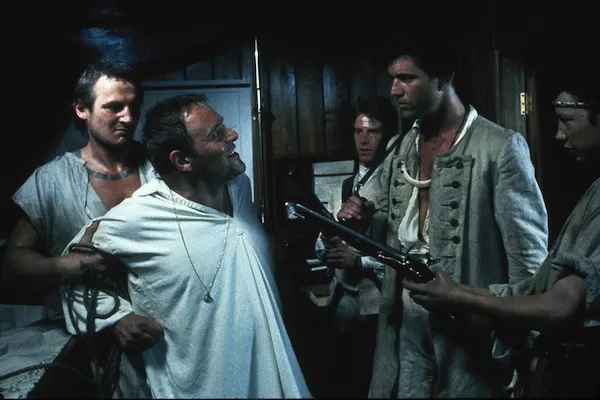
-
Liam Neeson, Anthony Hopkins and Mel Gibson in The Bounty (Photo: Twilight Time)
THE BOUNTY (1984). Creative Loafing's annual Film Issue last year took an in-depth look at the bountiful cinema of 1984, and it's further proof of the celluloid potency of that 12-month period that a picture as worthy as The Bounty didn't even earn so much as a footnote in the article (or, more tellingly, a mention in the accompanying list of the best films of 1984). While no match for the revered classic that earned the Best Picture Academy Award for 1935 (Mutiny on the Bounty, starring Clark Gable and Charles Laughton), this is an intelligent retelling that relates the historic mutiny through an altered prism. While most adaptations (including the notorious '60s take with Marlon Brando and Trevor Howard) have painted Captain Bligh as an unrepentant sadist and Fletcher Christian as a wholesome hero, The Bounty, reportedly the most accurate of all screen versions, elects to muddy the waters. Here, Bligh (Anthony Hopkins) isn't inherently cruel but does allow his strict notions of nautical justice to often overwhelm any common sense. And Christian (Mel Gibson) retains his core of decency but is also revealed to be both petulant and naïve. Scripter Robert Bolt (Lawrence of Arabia, A Man for All Seasons) allows all sides to have their say, Vangelis (Chariots of Fire, Blade Runner) contributes a fine score, and the legendary Laurence Olivier pops up in one of his final theatrical turns as Admiral Hood, seen presiding over Bligh's court martial. The Bounty also features early performances by two of today's most reliable actors, Daniel Day-Lewis (as a despised officer) and Liam Neeson (as a quarrelsome crew member).
Blu-ray extras consist of audio commentary by director Roger Donaldson, producer Bernard Williams and production designer John Graysmark; separate audio commentary by Stephen Walters, who served as the film's historical consultant; the theatrical trailer; and an isolated track of Vangelis' score.
Movie: ***
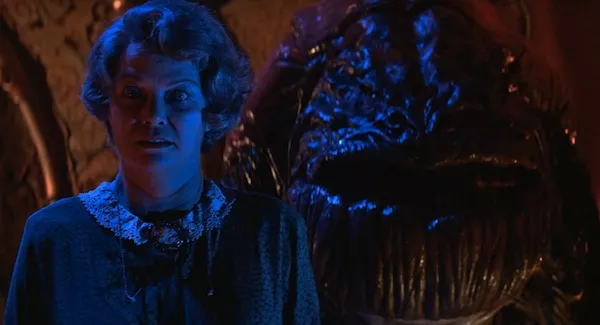
-
Louise Fletcher in Invaders from Mars (Photo: Shout! Factory)
INVADERS FROM MARS (1986). Once considered one of the defining "alien invasion" flicks of the 1950s, 1953's Invaders from Mars is rarely accorded the classic status that still greets cinematic stablemates like 1951's The Thing from Another World, 1953's The War of the Worlds and 1956's Invasion of the Body Snatchers. No matter: It's still a solid watch, and it's miles ahead of this hapless remake from the jokers who also gave the world Bolero, Firewalker and Breakin' 2: Electric Boogaloo. Produced by Menahem Golan and Yoram Globus through their Cannon Pictures, this finds young David Gardner (Hunter Carson) trying to convince the adults around him that a Martian spaceship has landed in his backyard and its extra-terrestrials are taking control of all humans. David's parents (Timothy Bottoms and Laraine Newman) and a crabby schoolteacher (Louise Fletcher, a long way from the cuckoo's nest) are among the first to fall victim, and David soon discovers that the only person who believes him (sort of) is the school nurse (Karen Black). Black was one of this country's finest actresses back in the 1970s — Five Easy Pieces; nuff said — so the fact that Carson is her real-life son reveals the adage of the apple not falling far from the tree to be a complete lie. Carson's dreadful performance is largely what prevents Invaders from Mars from even having a fighting chance right out of the gate, as the only thing missing from his overripe emoting is a Pacino-esque "Hoo-ah!" to punctuate the night air. Yet also sharing the blame is Tobe Hooper, the wildly inconsistent director whose work here ranks among his worst. The aliens created by Stan Winston are comical enough, yet Hooper indulges in overkill by turning the entire picture into a jokey enterprise that's ofttimes embarrassing to watch. Invaders from Mars turned out to be a colossal flop during the summer of '86, as audiences wisely elected to satisfy their thirst for sci-fi with the same season's Aliens.
Blu-ray extras include audio commentary by Hooper; a retrospective making-of featurette; original storyboards; and the theatrical trailer.
Movie: *1/2
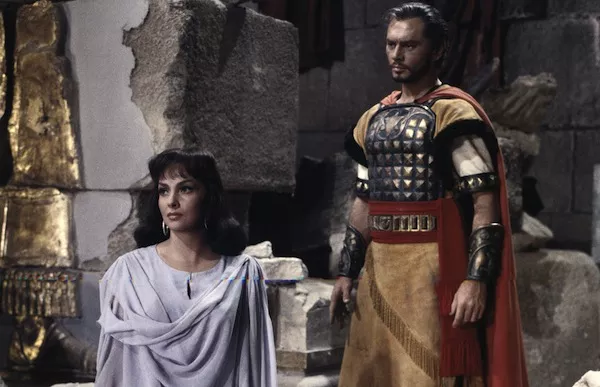
-
Gina Lollobrigida and Yul Brynner in Solomon and Sheba (Photo: Twilight Time)
SOLOMON AND SHEBA (1959). Biblical epics were basically to the 1950s what superhero flicks are to today: Release one and you were almost certain to make a bundle, regardless of the quality. In that respect, if Ben-Hur was The Avengers of its decade, then Solomon and Sheba was the Fantastic Four of its time, an expensive undertaking that earned sizable bank without being especially good. The sad tale behind this picture, the last for noted director King Vidor (whose credits included the "Lust in the Dust" Western Duel in the Sun as well as the delightful silent comedy Show People, starring gifted comedienne — and William Randolph Hearst's longtime mistress — Marion Davies), concerns Tyrone Power, who was set to star as Solomon and had filmed more than half his scenes before he died on set of a heart attack, felled at the young age of 44. (And just as James Dean had filmed a PSA on highway safety shortly before his fatal car crash, Power had similarly shot a PSA about heart attack warning signs not long before his death. But I digress.) Power was coming off a terrific performance in 1957's Witness for the Prosecution, and it would have been interesting to see his take on this role; instead, after his death, his scenes were reshot with Yul Brynner now essaying the part, and he proved to be an ill fit for the film. An actor of limited means (his Oscar win for The King and I notwithstanding), Brynner is especially one-note in this picture, wearing the same expression whether tending to his ailing father David (reliable Finlay Currie), dealing with his warmongering brother Adonijah (the great George Sanders) or romancing the lusty Queen of Sheba (Gina Lollobrigida, only marginally more interesting than Brynner) against the protests of his own people. The fight sequences — both the large-scale battles and the mano-a-mano skirmishes — are sometimes stirring, sometimes silly, and the movie itself is less a monument to the glory of God than to the limitations of lumbering solemnity.
Blu-ray extras consist of theatrical trailers and an isolated track of Mario Nascimbene's score.
Movie: **
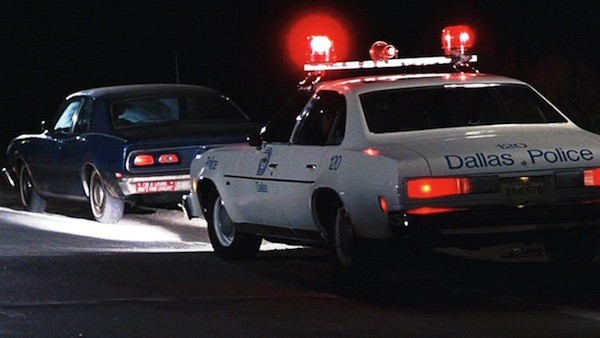
-
The Thin Blue Line (Photo: Criterion)
THE THIN BLUE LINE (1988) / HOOP DREAMS (1994). What do The Thin Blue Line, Hoop Dreams, Shoah, Roger & Me, Paris Is Burning, Brother's Keeper and Crumb all have in common? In addition to being exemplary nonfiction films, they were also the primary pictures whose failure to earn Academy Award nominations for Best Documentary Feature revealed the corrupt politics behind that category's voting procedures and eventually led to a complete overhaul of the rules governing that award. The Thin Blue Line and Hoop Dreams are arguably the best of the best, and Criterion has elected to release both pictures on Blu-ray (Hoop Dreams had already been available from the company on DVD).
It's not mere hyperbole to state that The Thin Blue Line is one of the most important movies ever made — it's a magnificent example of the worth of cinema, as it was directly responsible for freeing a man from prison. That would be Randall Adams, who had been charged by a corrupt judicial system in (where else?) Texas for murdering a police officer in 1976. Years later, filmmaker Errol Morris stumbled across the story, and it was apparent to him that the cop killer wasn't Adams but a habitual criminal named David Harris. Through a mix of interviews with the primary participants and artful recreations of key incidents (all backed by a terrific score by Philip Glass), Morris was able to make a mess of the prosecution's case, to the point that, after this film became a cause célèbre, Adams was eventually released from prison after wrongfully serving 12 years. (You would think Adams would have been forever worshipful of Morris, but he instead sued the director to gain sole possession of the rights to his own life story; honestly, some people!) Incidentally, Harris was put to death in 2004 for another murder while Adams passed away in relative obscurity in 2010.
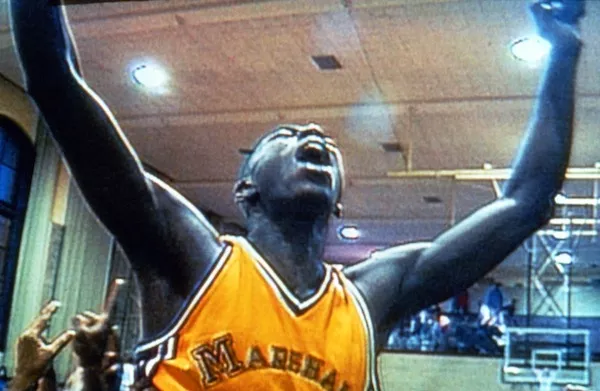
-
Arthur Agee in Hoop Dreams (Photo: Criterion)
Hoop Dreams, meanwhile, takes an in-depth look at Arthur Agee and William Gates, two inner-city high school students in Chicago who both dream of playing in the NBA. The odds against them are tremendous, though, as each boy must struggle with financial setbacks, personal injuries, familial conflicts and his own burgeoning self-doubts. Filmmakers Steve James (whose most recent picture was the Roger Ebert documentary Life Itself), Frederick Marx and Peter Gilbert spent five years working on this project, and their dedication paid off with a remarkable film saturated with ironic twists, heartbreaking scenarios and moments of pure jubilation. While the Academy's doc branch idiotically ignored Hoop Dreams, the film did nab an Oscar nomination for Best Film Editing (James, Marx and William Haugse).
Blu-ray extras on The Thin Blue Line consist of a new interview with Morris; a new interview with Joshua Oppenheimer, director of The Act of Killing; and a 1989 NBC report covering Adams' release from prison. (In related news, Criterion has also released a double feature Blu-ray of two earlier Morris titles, 1978's Gates of Heaven and 1981's Vernon, Florida.) Blu-ray extras on Hoop Dreams include audio commentary by James, Marx and Gilbert; separate audio commentary by Agee and Gates; the feature Life After Hoop Dreams; and a collection of excerpts from Siskel & Ebert tracking the acclaim for the film.
Both Movies: ****
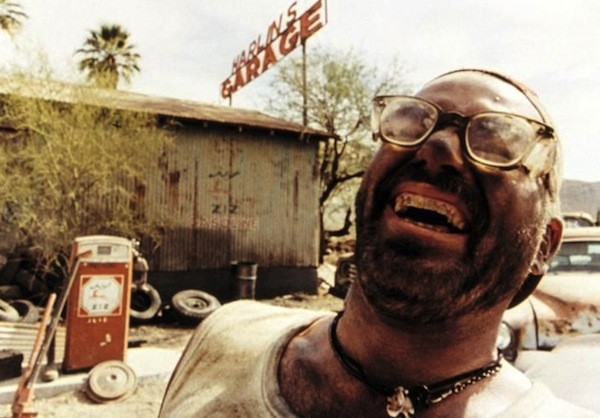
-
Billy Bob Thornton in U Turn (Photo: Twilight Time)
U TURN (1997). While Oliver Stone has yet to direct a memorable feature in this 21st century — World Trade Center, W. and Wall Street: Money Never Sleeps are raging mediocrities, while Alexander and Savages are downright awful — there existed a decade-long stretch when he was one of this nation's most interesting and uncompromising filmmakers, crafting such controversial conversation starters as JFK and Natural Born Killers (and, of course, finding more universal acceptance with his Oscar-winning Platoon). With the exception of 1988's lacerating Talk Radio, U Turn might be the most forgotten film in his canon — a shame, since it offers sinful pleasures for those willing to take the ride. Adapted by John Ridley from his own novel Stray Dogs, this is pulp fiction as filtered through Stone's hyperkinetic lenses, and it's set in a locale (Superior, Arizona, a real town!) that seems to exist on the map somewhere between Twin Peaks and Sin City. Sean Penn stars as Bobby Cooper, an unscrupulous small-timer whose unexpected stop in Superior (his car breaks down) finds him meeting a gallery of eccentrics, including a repulsive redneck mechanic (Billy Bob Thornton), a blind Native American beggar (Jon Voight), a teenage hothead (Joaquin Phoenix) and a big-hair waitress (Julie Hagerty) whose name really is Flo. He also meets — and lusts after — Grace (Jennifer Lopez), a desert flower married to her late mom's sleazy husband (Nick Nolte, armed with Gary Busey's choppers). Like all Stone productions from the period, U Turn is a technical marvel, with Robert Richardson's cinematography and Ennio Morricone's score worthy of special mention. The picture is darkly humorous, frequently violent and always playful (love the homage to Duel in the Sun), and its excesses clearly mark it as not for all tastes.
Blu-ray extras consist of audio commentary by Stone; separate audio commentary by producer Mike Medavoy and film historian Nick Redman; an introduction by Stone; the theatrical trailer; and an isolated track of Morricone's score.
Movie: ***

-
Reese Witherspoon in Wild (Photo: Fox)
WILD (2014). One of the 10 best films of 2014, Wild had been positioned first and foremost as a showcase for star Reese Witherspoon, creating the impression that the rest of the movie was no more worthy of awards recognition than a bottom-feeding Adam Sandler comedy. Yet Wild was far more than just Oscar bait for an A-list star — based on Cheryl Strayed's memoir Wild: From Lost to Found on the Pacific Crest Trail (with no less than Nick Hornby handling the adaptation), it's a galvanizing human-interest story of the highest order, centering on a woman who immediately emerged as one of last year's most complex screen individuals. In a remarkable turn that nabbed her a Best Actress Academy Award nod, Witherspoon is superb as Cheryl, who undergoes a strenuous 1,100-mile hike in an attempt to find herself after suffering through a series of personal crises. An adulteress and heroin addict, Cheryl's grown-up existence has been most informed by the cancer-related death of her mother Bobbi (Laura Dern, also Oscar-nominated), a single mom who had been attempting to improve her own lot in life when the disease hit hard. Absolutely devastated by her loss, Cheryl flounders until she stumbles upon the idea of embarking on this hike, an arduous odyssey that poses many risks but also allows time for plenty of soul-searching. Director Jean-Marc Vallée, coming off 2013's excellent Dallas Buyers Club, has fashioned an invigorating picture which, through its uncanny use of both flashbacks and songs, successfully provides a stream-of-consciousness flow that beautifully suits the piece's themes of reflection and introspection. As for Witherspoon, she had a banner year, producing Gone Girl, lending her marquee value to the sleeper pick The Good Lie and appearing as part of the impressive ensemble in Paul Thomas Anderson's Inherent Vice. Wild, however, represents the crown jewel of her 2014 accomplishments — it's a dizzying high-wire act, and she's performing without a net.
Blu-ray extras include audio commentary by Vallée and producers Bruna Papandrea and David Greenbaum; making-of featurettes; and deleted scenes.
Movie: ***1/2
